Search the Special Collections and Archives Portal
Search Results
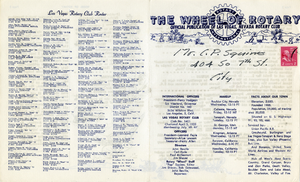
The Wheel of Rotary Las Vegas Rotary Club newsletter, March 30, 1950
Date
Archival Collection
Description
Text
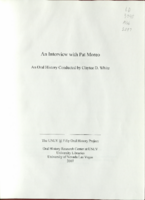
Transcript of interview with Pat Moreo by Claytee D. White, September 13, 2007
Date
Archival Collection
Description
Text
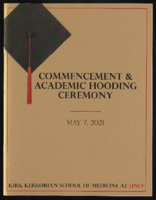
Kirk Kerkorian School of Medicine at UNLV 1st Commencement and Academic Hooding Ceremony
Date
Archival Collection
Description
Commencement program from University of Nevada, Las Vegas Commencement Programs and Graduation Lists (UA-00115).
Text

Sergio "Checko" Salgado oral history interview: transcript
Date
Archival Collection
Description
Oral history interview with Sergio "Checko" Salgado conducted by Laurents Bañuelos-Benitez, Barbara Tabach, Elsa Lopez, and Monserrath Hernández on June 4, 2019 for the Latinx Voices of Southern Nevada Oral History Project. Checko talks about his personal history that led him to pursue journalism and photography. He discusses his education and employment working in art galleries in Denver, Colorado and Las Vegas, Nevada and the various art exhibitions he has designed including in the Marjorie Barrick Museum at the University of Nevada, Las Vegas and in the Reynolds Senate Building in Washington, D.C.
Text
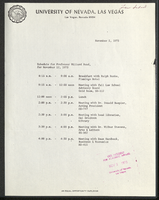
University of Nevada, Las Vegas law school planning: schedule, committee notes, correspondence, and reports
Date
Archival Collection
Description
Folder includes Citizens Ad Hoc Law School Committee notes by Janice S. Gould, "Final Report on Law Program (1967-68)", and correspondence and memos related to legal education at Nevada Southern University (later UNLV). From the University of Nevada, Las Vegas William S. Boyd School of Law Records (UA-00048).
Text
Cornero, Tony (Anthony Stralla), 1899-1995
Anthony “Tony the Hat” Stralla Cornero (1899-1955) was an American bootlegger and gambling entrepreneur from the 1920s to the 1950s. Famous for being the mind behind the Las Vegas, Nevada Stardust resort and casino, Cornero was also known for his affiliation with organized crime. He ran businesses and gambling ships with questionable legality in Los Angeles, California.
Person
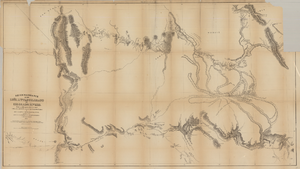
Map based on reconnaissance of the Zuñi, Little Colorado and Colorado Rivers in 1851 by U.S. Corps of Topographical Engineers
Date
Description
Image
Blue Diamond Mine Photograph Collection
Identifier
Abstract
The Blue Diamond Mine Photograph Collection depicts operations at the Blue Diamond Mine from approximately 1950 to 1971. The photographs include images of heavy machinery, mining structures, and workers. The photographs also contain aerial views of Blue Diamond Mine and the surrounding landscape.
Archival Collection
Alan Cummings Research Files
Identifier
Abstract
The Alan Cummings Research Files (1974-2004) are comprised of research files compiled by Cummings, an elementary school teacher for the Clark County School District (CCSD) in Southern Nevada. The files represent Cummings's work to persuade the Teacher's Health Trust, the employee benefit plan for the school district, to consider domestic partnership benefits for CCSD educators and administrators. Materials include personal correspondence, newspaper clippings, magazines, and court cases.
Archival Collection
Josiah Edward Spurr Papers
Identifier
Abstract
Collection consists of an original manuscript, "Geology and Ore-Deposition at Tonopah, Nevada" by Josiah Edward Spurr (1870-1950) with hand-drawn diagrams, and letters discussing the donation of the manuscript. The manuscript, which was published in the journal Economic Geology in 1915, is a geological description of the Tonopah mining area; the Tonopah Mining Company is mentioned frequently. It is undated, but the publication date suggests it was written approximately 1913-1915.
Archival Collection
